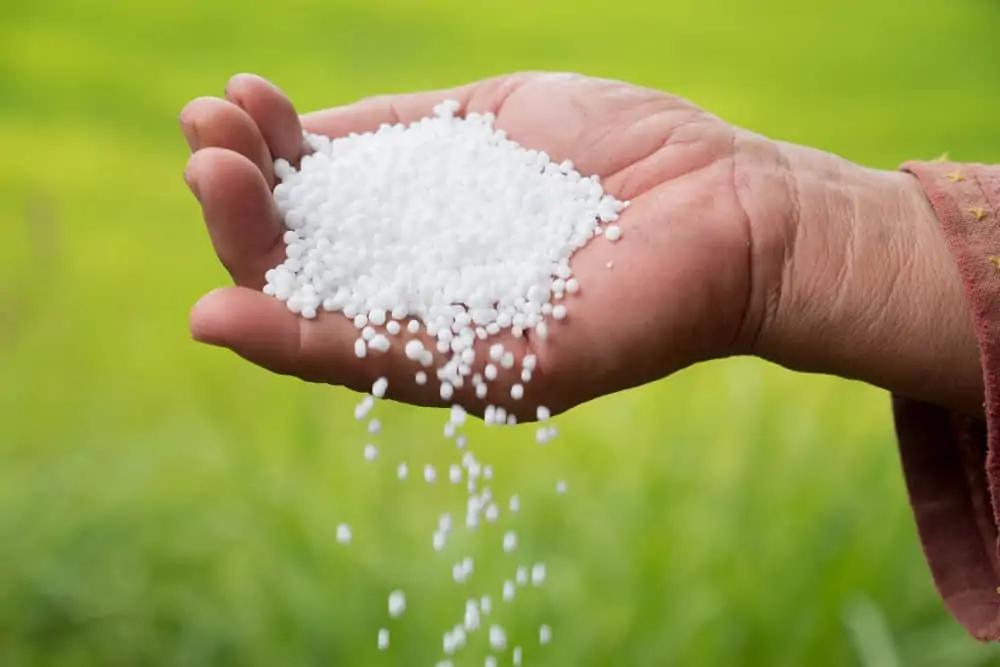We all want the best for our grass, don’t we? After all, no one wants their garden to be the eyesore of their street.
But is everything we can do for our grass the best? The last thing you want to do is purchase a product, use it, and destroy your grass in the process!
You don’t want brown, dry, or barren grass, do you? And with so many products on the market claiming to be the holy grail for your grass, you can be left confused, unsure where to turn!

But before you panic, take 5 minutes and spend it with us! We are here to tackle all of your grass needs! Today, we are looking at nitrogen, finding out if nitrogen is good for grass and how you can use it on your lawn today!
Is nitrogen good for grass?
Nitrogen is good for grass! It is considered one of the essential nutrients for plant development. In the soil, nitrogen is responsible for the green color in plants and their growth and development.
Although nitrogen is found abundantly in our atmosphere, plants cannot process it unless it is in the soil or added as a fertilizer. Your grass can then use the nitrogen to grow and develop, although caution is needed. Too much nitrogen can cause plant death, leaf burn, or diminished root system.
Alternatively, a nitrogen deficiency can also be damaging for your grass. You should be able to identify a nitrogen deficiency easily; if your grass has lost its green color and is turning yellow, a nitrogen deficiency is the most likely cause!
While nitrogen has many benefits for your grass, there is controversy surrounding the nutrient. Overuse of nitrogen can cause groundwater contamination. Also, creating synthetic nitrogen fertilizers uses large amounts of fossil fuels that damage the environment.
Many users opt for an organic source of nitrogen compared to a synthetic fertilizer to neutralize the environmental impact. Organic methods include composted manure, adding coffee grounds, or nitrogen-fixing plants like peas or beans. These will stimulate nitrogen in the soil, allowing your lawn to flourish!
If you opt for synthetic nitrogen fertilizer, remember to read the label and follow the instructions carefully to avoid using too much, damaging both the grass and the environment.
How do I add nitrogen to my lawn?
You can add nitrogen to your lawn through the soil with organic methods or synthetic nitrogen fertilizer. As we have seen, the best way to add nitrogen to your lawn is through the soil, allowing the roots to soak the nitrogen up.
Organic methods can often be cheaper alternatives; using household items, such as coffee grounds, you can mix these into a compost pile or add them directly to your soil. Not only does coffee release nitrogen, but it aerates the ground and improves drainage!
Other popular methods include using green manure crops; composted manure such as cow, goat, and rabbit manure can be added to your soil with a reduced risk of burning. Animal waste is high in nitrogen, so be sure that it is composted first to avoid damaging your lawn and any plants.
If these methods do not appeal to you, you can purchase a nitrogen fertilizer and use this to add nitrogen to your lawn. When using fertilizer, be sure to follow the instructions on the label.
Generally, these methods are applied directly to the soil during fertilizing seasons. These can vary depending on the grass you have, but the Spring or Fall is best. The cooler and drier climates will give the fertilizer the best chance to spread nitrogen into the soil and promote growth.
Whichever method you choose to add nitrogen to your lawn, we recommend just choosing one. This will avoid adding too much nitrogen, which can cause issues.
How much nitrogen can I put on my lawn?
0.9 lbs of nitrogen per 1,000 square feet of lawn are recommended. This recommendation includes lawn fertilizers with added nitrogen or organic methods of adding nitrogen to your lawn.
Usually, a lawn will require 1.8lbs of nitrogen for the whole year, meaning you only need to add nitrogen twice a year when fertilizing your lawn. Be sure you measure your lawn beforehand to ensure that you are using the appropriate amount of fertilizer or nitrogen!
If you are using a fertilizer with nitrogen added in, you might need to do some maths to calculate how much nitrogen is in the recommended amount of fertilizer and how that will relate to your lawn. These days, most labels consider this and offer a breakdown of nitrogen per serving.
The amount recommended here is suitable for all grass types, but remember that some might need more or less depending on any deficiencies. For example, Centipede and Fine Fescue typically need less nitrogen per season. If you are unsure, why not consult a professional who can help create the perfect lawn plan for you?
